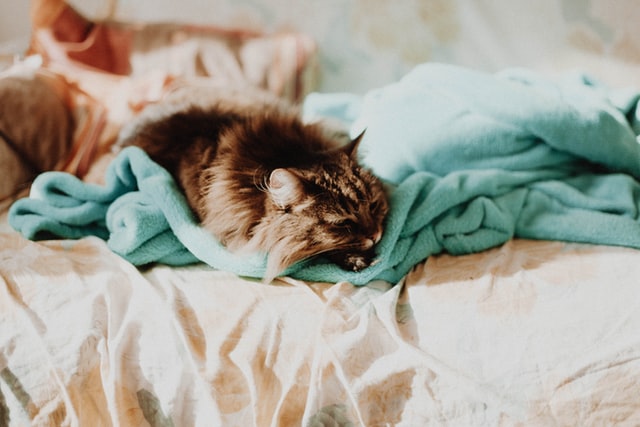Perhaps you happen to give your feline a rub on their body and suddenly feel that they have a bald patch, or their fur turns out to be thinner than it usually is. Cat hair loss, or cat alopecia, is a common problem for felines, and there are various reasons behind it, such as allergies, fleas, metabolic conditions, and skin conditions, among others.
Some hair loss can be accompanied by redness, scabs, irritation, or bumps, while others may appear normal. If your car is losing hair, read on to find out the possible reasons behind it. Keep in mind that this list is not exhaustive. Therefore, it is still best to check with your veterinarian to ensure your cat’s health.
What causes hair loss in cats?
There are some questions that may guide you in revealing the cause behind your cat’s hair loss: Is she grooming excessively? Does she lick that specific part of her body? Does she scratch herself a lot? Are there other felines in your house? And, are there any changes in your house or in their environment which may cause them stress and anxiety?

To help you better, listed below are some of the possible reasons why cats are losing hair.
1. Emotional and behavioral problems
When cats are stressed, they may display unusual behaviors, such as excessive licking and scratching, which, in turn, can cause hair loss. Also called “displacement grooming,” stressed cats groom themselves as it helps them be calm, as well as lower their stress levels.
In the long run, this behavior can develop into a condition known as “psychogenic alopecia.” Usually, cats with psychogenic alopecia scratch or lick their belly, inner forelimbs, tail, lower back, or sides. In some cases, this may be accompanied by redness and bumps. This type of alopecia is more common in female cats with nervous disorders.
To prevent psychogenic alopecia, make sure that your cat is mentally stimulated by providing them with various toys that they can play with. It is just as important to give them enough playtime and attention. If there are sudden changes in their environment, such as a new pet or the presence of something that they perceive as a threat, ask your veterinarian for an antidepressant or any medication that will help them calm down. There are also ways to properly introduce your resident cat to a new pet in order to reduce stress between the two parties.
2. External parasites
Cats may also lick their hair because of irritation and itching from fleas, mange, lice, mites, and other parasites. In some cases, cats may be oversensitive to antigens within the flea saliva, which can result in miserable itching. To relieve this, cats may overgroom themselves, which means that they may likely pull their hair out before it even falls. Bald patches from external parasites vary from small to large.
3. Allergies
Another common reason behind a cat’s hair loss is allergies. Like humans, cats may also be allergic to various factors, such as pollen, dust, food, medicines, and others. If your cat gets in contact with something that triggers their allergy, it may cause them to itch constantly, which results in overgrooming.
For this cause, you should immediately identify what your cat has recently come in contact with. Did you bring her to a new environment? Did you change her diet? Once you have an idea of the cause of the allergen, remove it and observe for a while if there are positive changes in your cat’s condition.
Fortunately, if you are unsuccessful in identifying the cause of the allergic reaction, your veterinarian can run a number of tests to help you and your cat.
4. Infections
Although not as common as allergies, infection is also a possible reason behind a cat’s hair loss, including cat ringworm and staph infections. This causes irritation on your cat’s skin which makes it impossible for them not to scratch the itching area. For ringworm infection, note that it is not a parasite despite its name. Rather, it is a fungal infection that causes circular lesions on your cat. Your veterinarian may prescribe ointments, medicated baths, or oral medications to treat this condition.
5. Medical conditions
Because there are specific hormones that are responsible for cat’s hair growth, imbalances and deficiencies may cause loss of hair. Hormonal imbalances, including hyperthyroidism – an overactive thyroid, can cause hair loss. This can also be accompanied by weight loss. There are also instances where a pregnant or lactating cat is losing her hair. You should not be alarmed because this is normal since there are hormonal changes in their body during this time.
In addition, increased levels of steroids in their body may also cause their hair follicles to die. Due to abnormal hormone levels, their new hair may or may not grow back.
6. Physical pain
Muscle and joint pain, such as arthritis or a fractured bone, may also be another cause of a cat’s hair loss. Because they want to ease the pain, they may continuously lick the area until their fur gets pulled out.
7. Acute moist dermatitis
Popularly known as “hot spot,” acute moist dermatitis is a skin condition that is common in dogs, but cats can possibly get it as well. Hot spots begin with skin irritation, and bacteria may infect the wound when your cat starts to groom the irritating part. During this time, your cat may experience sores that are hot and aching at the same time. Most probably, your cat will continuously groom the area, which means that the area will always be moist, thus preventing the wound from healing.
For hair loss caused by hot spots, your veterinarian may prescribe antibiotics.

8. General poor health
An unhealthy diet, underlying health conditions, or poor health can cause hair loss in cats. Because this is such a broad reason, you will most likely need your veterinarian’s help to identify the exact reason behind your cat’s alopecia.
It is worth noting that shedding is normal in cats, especially during summer and autumn. If your cat sheds and you don’t see any bald patches, it is probably because it’s their shedding season.
9. Cancer
Abnormal growths caused by the uncontrollable division of cells, called “neoplasia,” can cause cat hair loss. Fortunately, this type of cancer is rarely the reason behind cat alopecia. But, you are free to visit your veterinarian just to ensure that there is nothing serious behind your cat’s bald patches.
Uncommon but possible reasons for hair loss include burns, hereditary conditions, birth defect, diabetes, poison, friction, injuries that cause cut on their skin, nutritional deficiencies, reaction to medications, leukemia, and cat bite abscess, which is occurred when a cat fights with another cat that causes severely infected wounds.
Keep in mind that some reasons for a cat’s hair loss may also affect humans, such as ringworms. Although this occurrence is unusual, it is always worth booking an appointment with your veterinarian for a complete physical exam.
Symptoms of Cat Hair Loss
Symptoms usually depend on the reason behind the cat’s hair loss. Probably, the most obvious sign is bald patches on some parts of their body. While bald patches will not be noticeable at first, early signs can begin with changes in the thickness and texture of your cat’s coat.
Other symptoms include redness of the skin, bumps, scabs, blisters, scaling, scratching, cysts, loss of whiskers, easy bruising, skin loss, open sores, foul odor, hyperpigmentation, depression, unusual behavior, and lethargy.
Treatment of Cat Hair Loss
Treatment for your cat’s hair loss will depend on your veterinarian’s diagnosis. Below are some of the common treatments that you should expect for your cat:
- Topical cream and ointment
When your cat’s hair loss is caused by parasites such as fleas and mites, infections, and skin conditions, topical cream or ointment is usually the solution. Topical treatment is a remedy to hair loss, as well as to skin irritations and traumas.
- Antidepressants medications
For psychogenic alopecia, antidepressants and antianxiety medications are usually prescribed by veterinarians. This type of treatment is the most effective. However, it may cause usual side effects which are not severe. Aside from medications, eliminating environmental stressors is also effective in treating this alopecia.
Here are other ways to reduce your cat’s stress:
- Installing perches or climbing posts on high surfaces, or in front of a window gives your cat the option to rest on high areas if she wants to.
- Provide your cat with interactive toys to stimulate her brain and burn off her energy, such as feather sticks, moving mice, and tower intelligence toys.
- Give your cat a diffuser that is specially made for cats. These diffusers usually release a feline pheromone which helps calm cats.
- Provide your cat with boxes that may serve as her own, personal space.
- Use food puzzle toys to allow your cat “hunt” her own food.
- Antihistamines
Antihistamine is used to treat hair loss caused by allergic reactions. Considered a low-risk, this kind of treatment can be accompanied by other treatments.
- Cause-Specific treatments
For a more specific cause of hair loss, such as a serious underlying condition including cancer, it is best to speak with your veterinarian as they know the best way to treat your cat.
Once you take your cat to the veterinarian, they would first take samples of your cat’s skin surface and look at it through a microscope to search for parasites, fleas, yeast, mites, and other bacteria that cause hair loss. A skin biopsy or culture may be done as well.
If none were found, your veterinarian may also do blood work to search for hormonal or thyroid imbalance. If there’s still none, they may use X-ray, ultrasound, or other imaging tools to detect cancer or other possible underlying health conditions.
How to Prevent Hair Loss
Here are some of the ways you can do to prevent your cat from losing its hair:
- Thoroughly examine your cat’s hair and skin at least once a week using a fine-toothed comb. Look for the presence of mites and other parasites that may cause hair loss.
- Regularly clean your cat’s bedding, scratch posts, toys, and other items to make sure that no virus or bacteria lingers near them.
- Provide your cat with mentally-stimulating toys and activities so that they don’t get bored, which can result in boredom and depression.
- Even if they are not the sweetest pet, your cat needs your time, affection, and attention. Therefore, make sure to spend some time for playtime and rubs.
Will my cat’s hair grow back?
Again, this will depend on the reason behind your cat’s hair loss. While a cat’s hair will grow back in most cases, there are occurrences where the hair loss is permanent. Some may also have future episodes of baldness, while others may not experience future occurrences.
For example, baldness or hair loss caused by injuries, such as when a cat accidentally cut their skin, may cause permanent hair loss in that specific area.
Final Thought
In the end, what’s important is not to panic if your cat is losing hair. Take the necessary steps, such as asking yourself the questions which may help identify the reason behind your cat’s hair loss, and if you found none, it is time to consult your veterinarian for an exam. It is necessary to administer the right treatment for your cat, as improper medication may result in worsening hair loss.
After completing the appropriate treatment, make sure that your cat gets follow-up care from your veterinarian to ensure that they are fully treated. If your cat’s hair loss is permanent, don’t panic as it will not greatly affect how she will live her life in the future. Just be mindful of providing your cat with a sweater or a jacket during cold weather to protect their bare skin from the cool air.